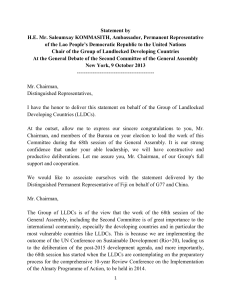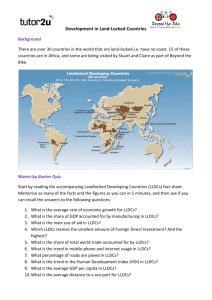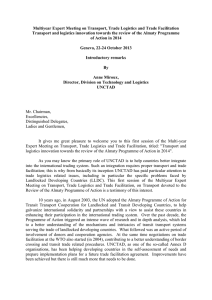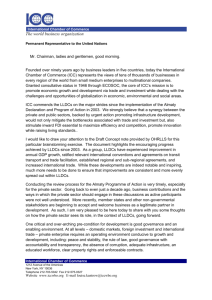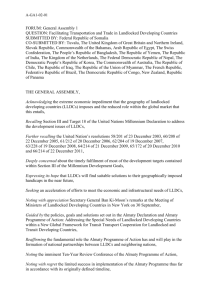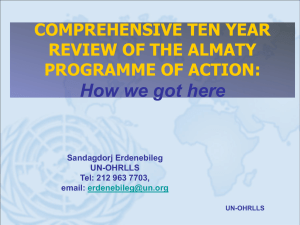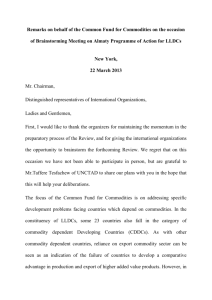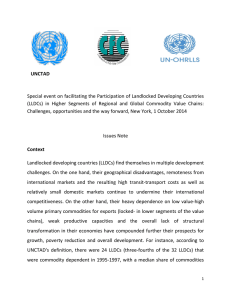Statement by Ms. Heidi Schroderus-Fox,
advertisement
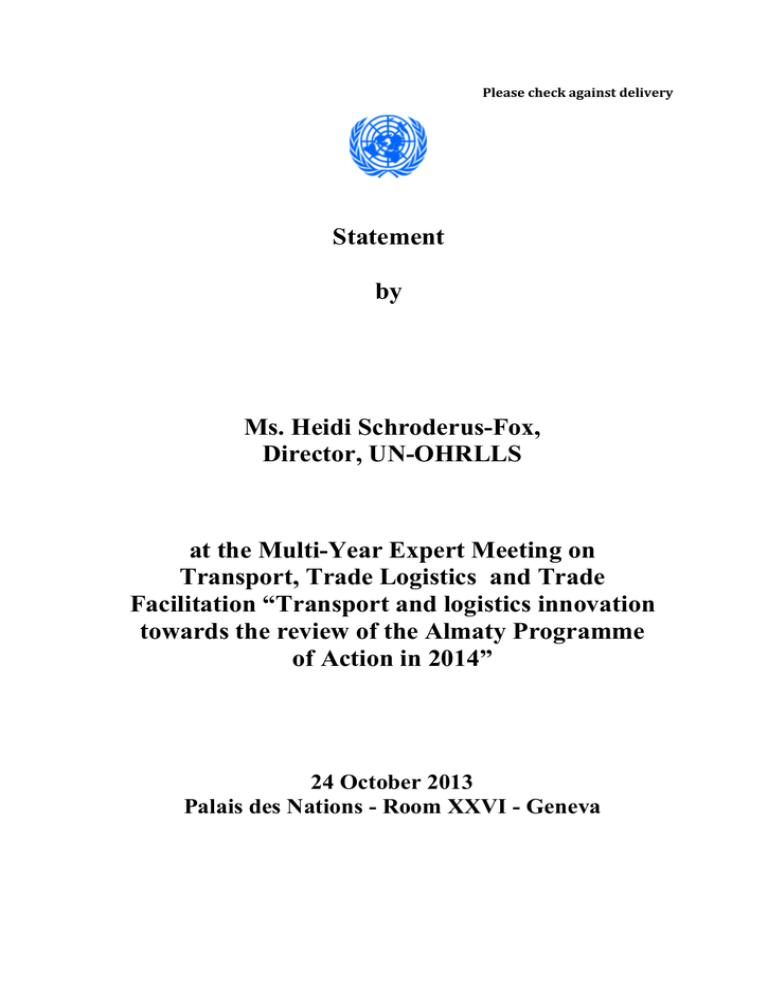
Please check against delivery Statement by Ms. Heidi Schroderus-Fox, Director, UN-OHRLLS at the Multi-Year Expert Meeting on Transport, Trade Logistics and Trade Facilitation “Transport and logistics innovation towards the review of the Almaty Programme of Action in 2014” 24 October 2013 Palais des Nations - Room XXVI - Geneva On behalf of my Office, I would like to thank UNCTAD for organizing this expert meeting which is being held in the framework of the preparatory process of the comprehensive ten-year review conference on the implementation of the Almaty Programme of Action to be held in 2014. Allow me at the outset to thank UNCTAD for the priority that your organization attaches to the issues of landlocked developing countries. As I am sure you all know, the premise of the Almaty Programme of Action is to use genuine partnerships at national, bilateral, sub-regional, regional and global levels – between LLDCs and transit countries and their development partners, and between the private and public sectors – to support the landlocked developing countries to overcome the challenges of being landlocked through working on the priority areas: i) Fundamental transit policy issues ii) Infrastructure development and maintenance iii) International trade and trade facilitation iv) International support measures v) Implementation and review Landlockedness hinders full participation in international trade and minimizes comparative advantage. A recent study by my Office revealed that LLDCs’ trade was just 61% of the trade volume of coastal countries while transport costs for LLDCs were 45% higher than a representative coastal economy. Because of landlockedness the level of development in the LLDCs is on average 20% lower than what it would be were the countries non-landlocked. Improved transport and trade facilitation are still key to reducing the high trade and transport costs for LLDCs. Over the last two days, this meeting discussed some of the specific transport services issues that landlocked developing countries face when attempting to trade and connect to global markets. In particular, you discussed the progress, challenges and opportunities for designing and implementing transport and logistics solutions and innovative arrangements in the fields of: Institutional developments of transit corridors Technology solutions for cross border management, port community and customs transit systems Corridor transit arrangements Transport systems and policies We are now near the end of the ten years of implementing the Almaty Programme of Action - a crucial milestone for the landlocked developing countries. The outcomes of this meeting will feed directly into the 1 conceptualization of the next development framework for LLDCs. As set by a resolution of the UN General Assembly, the Comprehensive Ten-Year Review Conference on the Implementation of the APoA will be held in 2014. It provides an opportunity to take stock of the achievements, share our concerns, best practices and develop a common action-oriented framework for the next decade, based on scaled-up partnerships among landlocked and transit developing countries and their development partners. Preparatory process for the Conference The preparations for the Ten-Year Review Conference are well underway in the three main tracks: the inter-governmental track; the UN Inter-Agency track; and the Private Sector track. The inter-governmental track Under the inter-governmental track, regional review meetings are being held in close collaboration with the UN Regional Commissions. The Euro-Asia Regional review meeting was convened in March this year in Vientiane, Laos and the Africa regional review meeting was held in Addis Ababa in July this year. The meetings adopted outcome documents that present an assessment of the implementation of the Almaty Programme in the regions and provided proposals for the next development decade. The Latin American regional review meeting will take place on 18-19 November this year in Asunción, Paraguay. At the national level, LLDCs have been requested to submit national reports on the implementation of the Almaty Programme that will directly feed into regional and global preparations. The inter-governmental track will culminate with two preparatory committee meetings that will prepare the Outcome Document for consideration and adoption by the Conference. The inter-agency track The Inter-Agency track and substantive preparations are led by my office through the Inter-Agency Consultative Group that comprises key UN system, international development and financial institutions and other regional organizations. The Group has held three consultative meetings on the preparatory process of the conference, while organizing thematic preconference events that will enrich the inter-governmental debates in areas such as international trade and trade facilitation, infrastructure development, climate change, desertification and land degradation, enhancing productive capacities and south-south and triangular cooperation, and addressing vulnerabilities of landlocked developing countries. 2 For example, High-level meeting on International Trade, Trade Facilitation and Aid for Trade was held in September 2012 in Almaty back to back with the Fourth Meeting of Ministers of Trade of Landlocked Developing Countries. In March 2013, my Office organized a Brainstorming Meeting on the Priorities of a New Development Agenda for the Landlocked Developing Countries that discussed the key development challenges and needs of LLDCs and identified the priorities for a new development agenda for the LLDCs. In June 2013, my Office jointly organized with the World Bank, an important event in Washington D.C. on Transport Development and Trade Facilitation which highlighted the progress that has been made to connect and integrate LLDCs into international markets. In September 2013, International Road Transport Union and the government of Tajikistan organized a High-level Conference on Road Transport. An event on Building the Resilience of Landlocked Developing Countries to the Impacts of Climate Change, Desertification, Land Degradation and Drought was organized by my Office, together UNFCC and UNCCD in Namibia in September. The thematic pre-conference events have highlighted key development challenges and needs of LLDCs that should be incorporated into the new programme of action. Enhancing productive capacities in LLDCs, supported by provision of financial and technical assistance and capacity building from development partners, has emerged as critical. LLDCs should aim to transform their economic structures by promoting competitive industries and export structures that produce higher value-added products. Many of the meetings also underscored the importance of the service industry, the role of the private sector and the growing importance of regional and south-south cooperation. Overall, the pre-conference meetings suggested that the new development agenda for the LLDCs must not be designed simply as a sectoral programme but should concretely address LLDCs’ developmental challenges in a more holistic manner. While the new programme should focus on addressing social and economic development, poverty reduction and sustainable development, it must retain international trade, transport and transit issues at its core. In particular, increased ratification and accession to UN and other international conventions, as well regional and sub-regional and agreements on transport and trade facilitation by LLDCs and their transit neighbours has been acknowledged as critical to harmonizing the rules and procedures of conducting trade and transport. Increased investment in infrastructure development and upgrading, including through enhanced partnerships and exploration of innovative financing, should also be a priority. 3 The outcomes of this meeting here in Geneva will complement the existing information that will feed into the deliberations of the next development framework for LLDCs with respect to transport, trade and trade facilitation. Private sector track Lastly, the Private Sector Track has also been launched, with the establishment of the Private Sector Steering Committee. Its aim is to ensure that private sector actors are fully engaged in the preparatory process and are active in identifying concrete, action-oriented proposals addressing LLDCspecific problems and challenges in the area of trade and transport facilitation, investment and enterprise development. The private sector track will culminate with an Investment Forum, to be held as a high level event at the Conference in 2014. The Ten-Year Review Conference of the Almaty Programme is a major undertaking of the entire United Nations system and the international community. I wish to call for your continued active engagement in the preparatory process of the conference. WTO Trade Facilitation negotiations I would like to highlight one area where active engagement and involvement of the delegations here in Geneva, together with the support of relevant international organizations, is needed as we prepare the future development framework for the LLDCs. It is the WTO Trade Facilitation negotiations. Trade facilitation has become the most important trade policy instrument for LLDCs to achieve gains from international trade. Trade facilitation measures that have been developed and adopted in LLDCs and along transit corridors include one-stop border posts; single window processing; harmonized road transit charges and road customs transit declaration document; harmonization of axle load limits; third party motor insurance schemes, use of TIR Carnets; and increased accession to international transport and transit conventions as well as regional and sub-regional transit agreements. Yet, eight of the ten countries throughout the world where trading across borders is most difficult are LLDCs. The cost of exporting a container was $3,040 on average for LLDCs, compared with $1,268 for transit countries. Similarly, the cost to import a container was $ 3,643 for LLDCs compared with $1,567 for transit countries. LLDCs also experience longer times for exporting and importing and additional documentary requirements. 4 Clearly, more needs to be done to ensure faster and cheaper trade across border for LLDCs. The WTO Agreement on Trade Facilitation would ensure just that. It has the potential to address many of the fundamental transit policy issues that affect LLDC exports, including simplifying customs procedures and reducing costs and time in the clearance of goods. The negotiations aim to clarify and improve relevant aspects of Article V on freedom of transit Article VIII on fees and formalities connected with importation and exportation Article X on publication and administration of trade regulations of the GATT 1994, with a view to further expediting the movement, release and clearance of goods, including goods in transit. The most recent draft consolidated text on trade facilitation contains detailed provisions for addressing transit-related restrictions, fees, paperwork and other issues related to traffic in transit. The specific elements included in the draft agreement would, if agreed, reinforce the principle of freedom of transit by ensuring unhindered access for traffic in transit through the territory of neighbouring countries, irrespective of the place of origin of the vessel, departure, entry, exit or destination, or ownership of the goods or of vessels. The draft agreement also contains provisions that would strengthen the principle of non-discrimination of goods in transit as it applies to matters concerning charges, transport measures, regulations and formalities and would ensure that these do not constitute disguised restrictions to trade. Furthermore, the draft provisions of the agreement would ensure that any charges applied on transit traffic are reasonable and based only on the cost of procedures and services rendered and would clarify that goods in transit are not subject to further customs charges, formalities, inspections, quality or technical standards controls. The provisions also ask for implementation of certain measures to facilitate flows of goods in transit, such as provision of separate infrastructure for traffic in transit, advance filing and processing of documentation, while prohibiting measures that hinder the flow of goods such as further controls while in transit and limiting the use of convoys. In addition, the provisions in the draft agreement aim to reduce formalities, documentation and procedures connected with importation and exportation, through measures such as electronic submission of documents; electronic 5 payment; application of risk management practices; preferential treatment for authorized operators; reduction, relaxation and harmonization of documentation requirements; establishment of single windows; and border agency cooperation. The negotiations also aim to enhance technical assistance and support for capacity building in these areas, recognizing that this is vital for developing and least developed countries to enable them to fully participate and benefit from the negotiations. LLDCs in particular require this kind of support as they are beset by limited capacities and dependence on their transit neighbours, many of which are also developing countries. The early conclusion of the WTO Agreement on Trade Facilitation in Bali is of paramount importance, in particular for the LLDCs. The WTO stipulates that a Trade Facilitation Agreement could stimulate the $22 trillion world economy by more than $1 trillion. According to the OECD, the potential reductions in trade costs for landlocked developing countries from the trade facilitation measures negotiated in the WTO would amount to over 16 per cent. All members need to engage in the negotiations with a true sense of purpose and show the necessary flexibility to build consensus on key issues. LLDCs should actively participate in the WTO negotiations and demand adoption of more ambitious texts with binding and ambitious provisions. LLDCs should seize this opportunity to strengthen those WTO rules that directly affect their trade. Over the last two days, we have been discussing transport, trade logistics and trade facilitation solutions that will contribute to building the substantive basis for the Second UN Conference on LLDCs. It is my hope that the upcoming Conference will come up with a comprehensive framework addressing broader aspects of development in LLDCs in a holistic maner, while recognizing that improved transport and trade facilitation is still crucially important for improving trade and for greater integration of LLDCs into the international markets. 6
